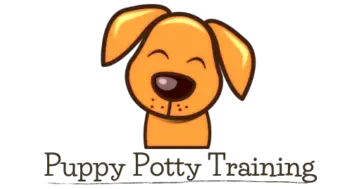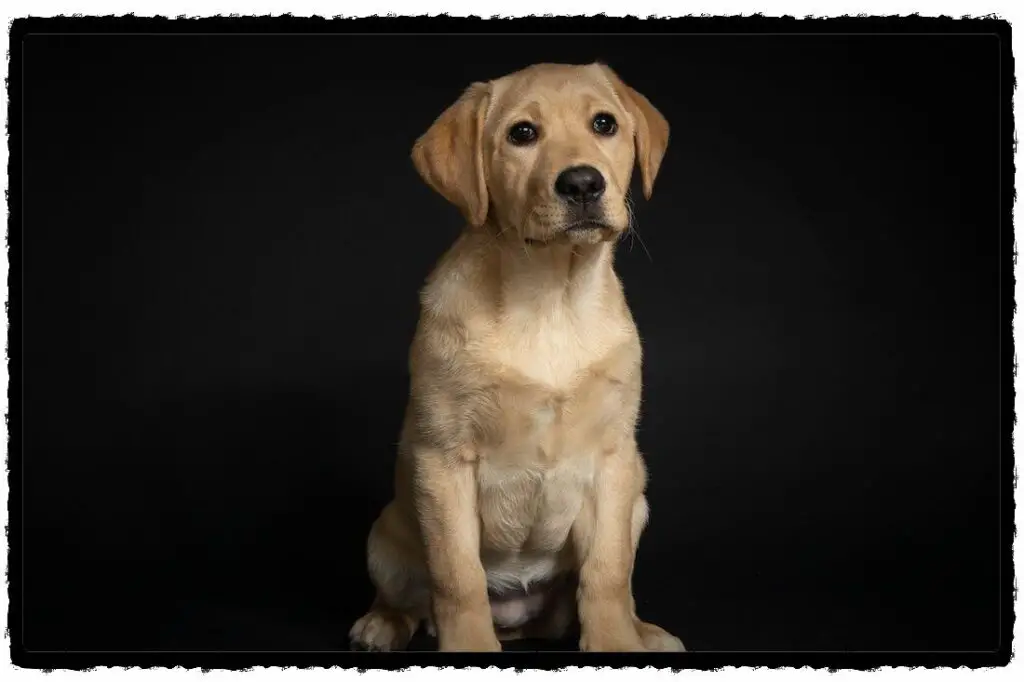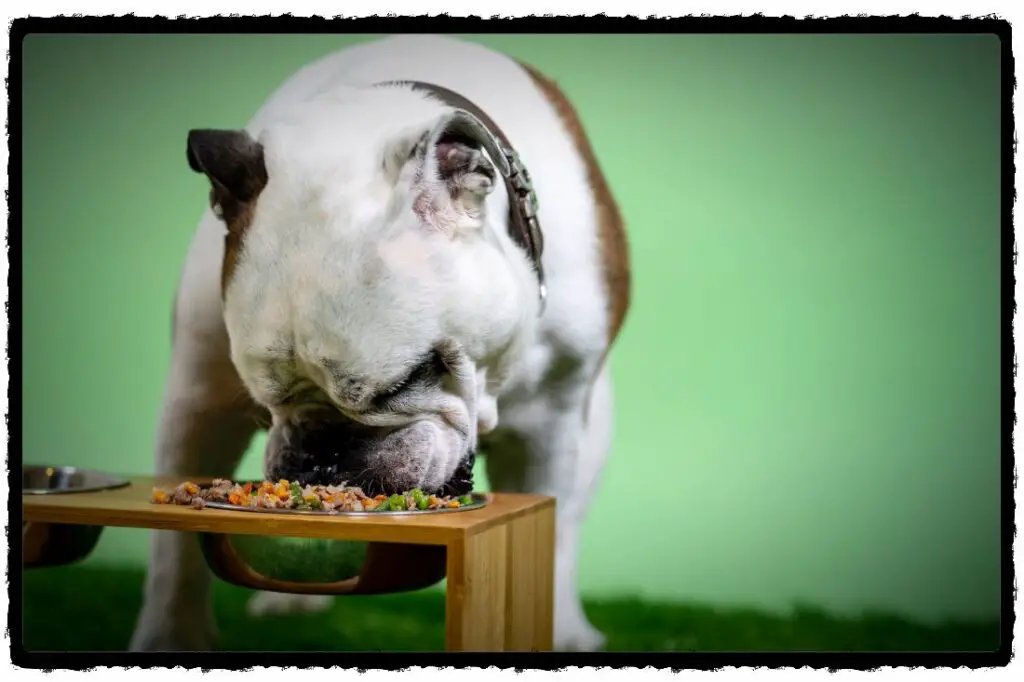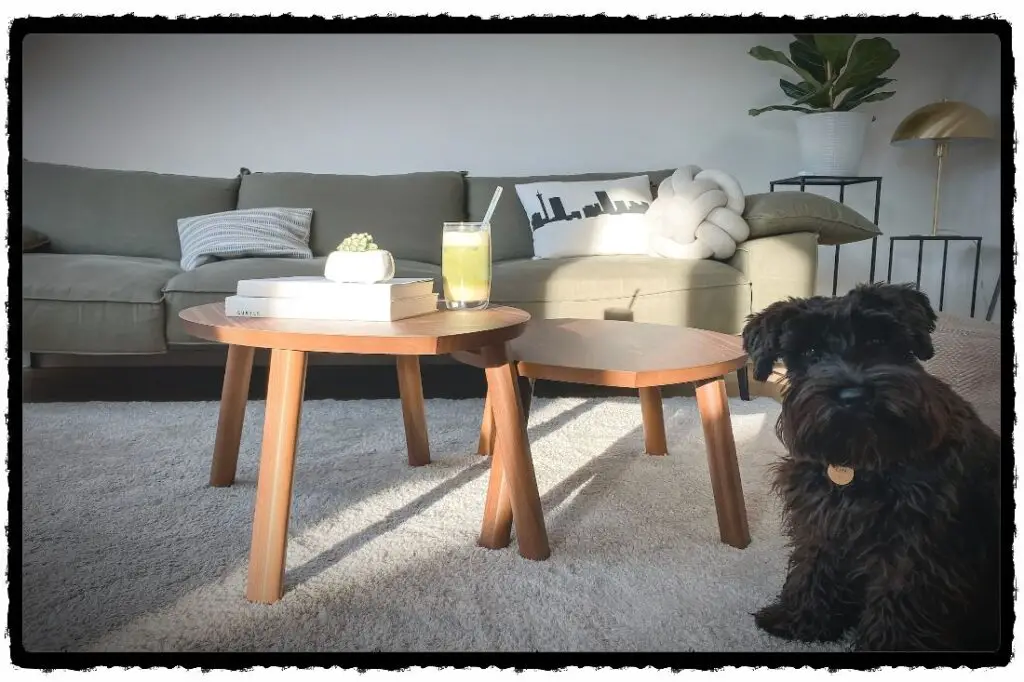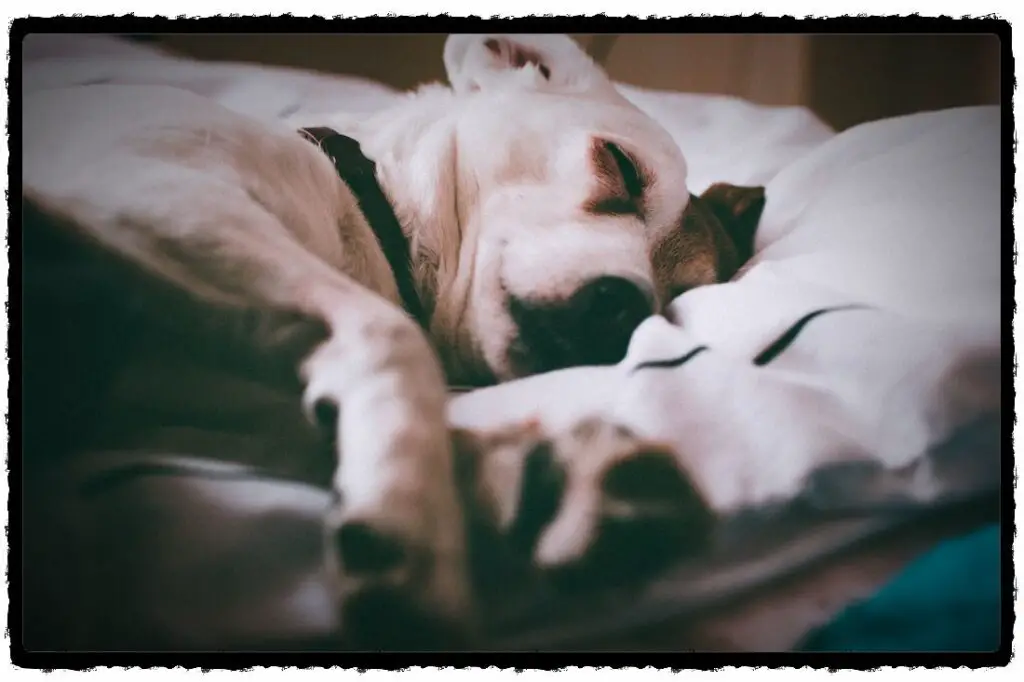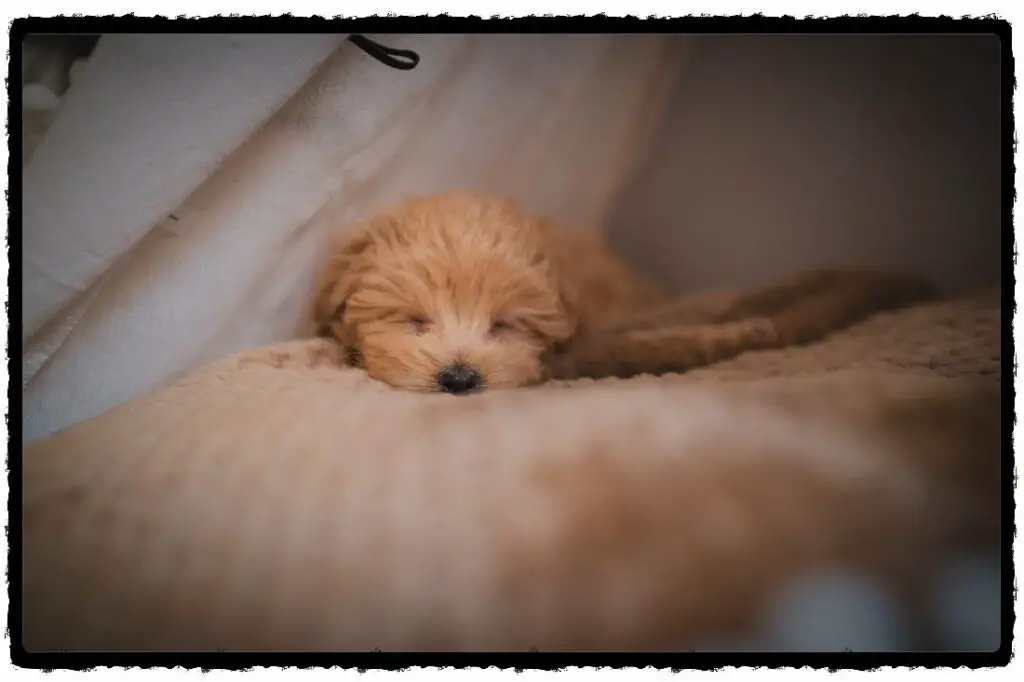Having a baby and pets in a house together seems to be a lot of fun. You can dream of your baby and dog playing and growing up together, but getting them along is usually not so simple. For example, when your potty-trained dog starts to pee in the house after a new baby. It becomes overwhelming. You can’t care for a newborn and a regressing dog simultaneously.
Here I will help you figure out why your dog might be doing this and what you can do about it.
Can a new baby cause a dog to pee in the house?
Not only a new baby but anything different around a dog’s surroundings can cause your dog to pee in the house. Even if your pet has been fully potty trained for years, you can have difficulty disciplining him.
I mentioned this as a reason in my article about dog potty training regression.
Look, it’s not only you whose life is upside down with a newborn. Your dog is also going through a huge change in his life.
This post may contain affiliate links. Please read our full disclosure here.
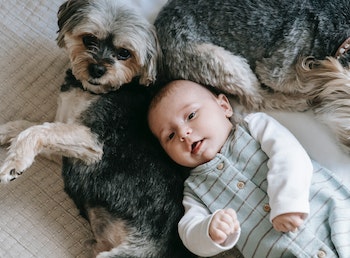
Why is my dog peeing in the house after a new baby?
Here are a few reasons why your dog might be peeing in the wrong places after a new baby in the house.
- Urine Marking: The most common and obvious reason is urine marking. It’s a natural desire of dogs to mark their belongings when they feel insecure. Your dog may look towards the baby as a threat to his personal space, so he might be trying to mark the house to tell the baby that these are “his.”
- Aggression: Some dogs (especially the dogs that are not friendly with human kids) may become aggressive in the presence of the baby. But they can’t do anything, so they start marking.
- Learned from the baby: Babies pee in their diapers. Right? Sometimes, you can’t smell it, but your dog can! They’ve got a stronger sense of smell. Your dog might have learned from the new baby that we can pee in the house. It seems strange, but people usually neglect this issue. Dog’s nose is different than ours. They may smell your baby’s pee and start peeing in the house.
- He is feeling neglected: It’s very obvious that your dog is not enjoying all the attention and love he used to get. Some people confine (and even lock) the dog, which increases the problems. The dog will feel more neglected and pee more.
- He is submitting himself: Dogs not only urinate to mark the territory. They urinate to submit themselves. If your dog falls in love with your baby, he may start urinating around him to signal acceptance.
- He smells pee in the house: This reason is the same I mentioned above. The babies pee in the house. If you are not disposing of the baby diapers properly (out of the house) or the diaper is leaking, your dog might be smelling pee in the house. As everyone knows, dogs pee where they smell pee.
Moreover, if your dog peed in the house and it is not cleaned with an enzyme cleaner, he may go there again because of the existing urine smell.
Is it dog potty training regression after a new baby?
Potty training regression is when a potty-trained dog starts having potty accidents in the wrong places instead of going to the fixed potty spot (pee pad or outside). If your dog is going in the right place but urinates inside too (especially if the amount of urine is small), it is urine marking.
Repeat urine marking will lead to potty training regression, so it’s not anything you can allow.
If your dog is forgetting his potty spot and peeing inside the house (in the wrong place), then it is potty training regression. And it needs to be fixed with the basic potty training method.
What to do when your dog is peeing in the house after the arrival of a new baby?
Here are the things you must do when your dog starts peeing in the house.
1- First clean with an enzyme cleaner:
When your dog pees in the house, you must clean it with an enzyme cleaner. Check with a UV flashlight; where the urine stains are, and then get your enzyme cleaner to clean them.
Simple household cleaners won’t do anything. Only enzyme cleaner can completely neutralize dog urine smell.
You can also use an enzyme cleaner to clean your baby’s urine stains in case of diaper leakages. Just make sure to get the enzyme cleaner that is suitable for the surface you are using it on.
Here’s the list of best enzyme cleaners according to surface type.
2- Do not leave them unsupervised:
If your dog is uncomfortable with your baby or is extra loving towards him, you shouldn’t leave them unsupervised.
Even if they are doing great, I still recommend, “please don’t leave them unsupervised” until they are settled down.
Your dog may jump on the baby with excitement or anger. He doesn’t know how to show love to a tiny baby.
Be on the safe side. Don’t let them play alone. Use baby gates or a playpen to confine the dog when you are not around. Or keep the baby room’s door closed.
3- Create a bond between the dog and the baby:
Creating and setting the bond between your dog and the baby is crucial. When your dog sees the baby, give him a treat. So he understands that his relationship with this baby is something positive.
Let him sniff the baby and give him treats. When the baby cries, give him a tasty treat, so he recognizes the crying sound as something positive.
4- Get to the basics of potty training:
So, your dog has already started peeing in the house after you welcomed your newborn. It may lead to potty training regression.
So, the best thing to do at this time is; to get back to the basics of potty training, i.e. setting a schedule (writing it down) and taking the dog on the leash outside when he needs to pee.
(Find out the right method of potty training here)
You can download the “dog potty training tracker” below (FREE)
5- Get help from a professional dog trainer:
If you see that your dog is doing well with the baby and you have done everything to stop him from peeing inside, It is best to seek help from a professional dog trainer.
6- Use an air purifier to overcome odor in the house:
Your dog might smell pee in the house, leading him to pee there again and again. As I mentioned above, this repeat peeing in the wrong place will cause potty training regression.
It is best to take care of ventilation in the house. An air purifier is a must-have when you have babies and pets in the house.
I recommend BISSELL MYair Air Purifier as it has activated carbon that can reduce pet odors from the house. It helps reduce pollen, dust, and smoke, which is also great for the baby’s health.
7- Dispose (or wash) the diapers properly:
The baby’s urine smell (diaper smell) may invite the dog to pee inside. Make sure to dispose of the baby diapers properly.
Use Ubbi Disposable Diaper Sacks to dispose of the diapers. These are easy to use and tie. The sacks are lavender scented and contain 20% recycled material.
Also, put a water-proof sheet under the baby so that his mattress is protected from the smell. Clean the water-proof sheet with Puracy Natural Baby Laundry Stain Remover,
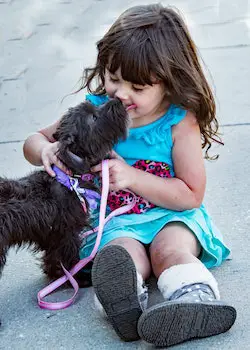
How long does it take a dog to adjust to a new baby?
I can’t provide you with a set answer to this question. No one can! It depends upon so many factors like:
- Have you prepared the dog in advance by changing his routine and giving him less attention before the baby’s arrival?
- How did you introduce the dog to the baby?
- How sensitive is your dog?
- What’s the adaptability level of your dog’s breed?
- Did you create a positive attachment with the baby?
- Is your dog being locked or yelled at?
- Do you have other kids in the house?
- How well trained is your dog?
Here’s an estimate:
If you introduce your dog to the baby with positive reinforcement, if your dog is getting enough attention and exercise (i.e. daily walks), and if you are keeping up with your dog’s training, he should adjust with the baby within a month or two.
However, if your dog is not getting enough exercise and attention, someone keeps yelling at him, or he is punished after the baby, he is most likely to see the baby as a threat to his life, and there are chances that he won’t adjust with the baby.
Signs dog is jealous of the baby:
Here are a few signs of understanding that your dog doesn’t like the newborn or is jealous of him:
- Growling
- Aggressiveness
- Barking when the baby cries
- Peeing when he sees the baby (urine marking)
- Not trying to sniff the baby
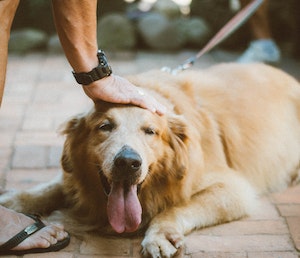
How do I make my dog feel loved after having a baby?
First of all, you should prepare the dog before having the baby. 9 months is a great span of time for setting your dog’s new schedule and making him used to less attention.
But at this point, I understand that you already have a baby in your house and looking for ways to get your little ones settled with each other.
Most importantly, pay attention to what your dog wants to tell you. Do not ignore his cues.
Try these tips:
- Get new treats (with different tastes) for your dog. Make sure to buy popular brands as the goal is to make your dog happy.
- Bring the dog near the baby and give him a treat.
- Let him sniff the baby and treat!
- If your dog looks comfortable, put the dog treat on the baby’s bed and let him eat it from there.
- When your baby cries, give him a treat.
- When the baby is in your lap, pat your dog with one hand and make him a part of all the love.
- Take the baby (in a stroller) while the dog walks.
- Provide your dog with personal space. Put some relaxing and chewing toys in his crate.
- Play with the dog sometimes when the baby is nearby.
- Follow up with the basic training (especially obedience and potty training)
How to relax your dog when he is not comfortable?
Here are a few product recommendations to help calm your dog and make him more trainable.
1- A calming collar:
A calming collar is a good option. Although it doesn’t work for severe anxiety cases in dogs, they do help most dogs feel better and calm.
It’s worth giving a try. I recommend ADAPTIL calming collar. Just put it on your dog; the body heat will activate the pheromones.

Give this collar a try; if it works, you will replace it every 3-4 weeks.
2- Dog calming diffuser:
The other best option is Dog calming diffuser. You will just plug in the diffuser, and it will release pheromones that will mimic the mother dog’s natural nursing pheromones.
The calming diffuser reduces separation anxiety and the stress your dog will feel in the presence of a new baby.

ThunderEase Dog Calming Pheromone Diffuser Kit is a great option. Try it.
3- Licking and chewing toys:
Licking and chewing; these two actions that are incredibly helpful for dog anxiety. Chewing triggers endorphins in dogs, making them happy and energetic.
Click here to find some great chewing toys for your dog (Amazon).
Conclusion:
A dog, once the center of attention of his human parents, has to share all the love with a new baby, which might put the dog under stress. Or it may be the opposite; your dog might be over-excited in the baby’s presence.
Whatever the case is, you may notice sudden changes in your dog’s behavior, including peeing in the house or potty training regression.
First, calm down your dog, create a bond between them (baby and the dog), and yes! Don’t forget to clean up with an enzyme cleaner.
Read more:
